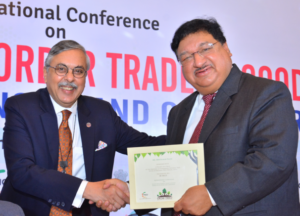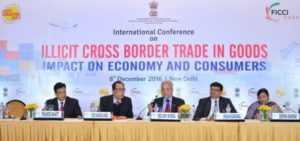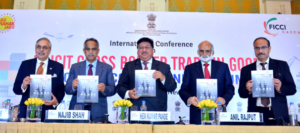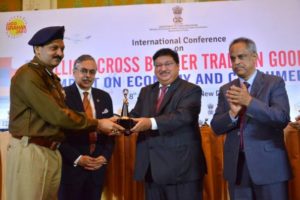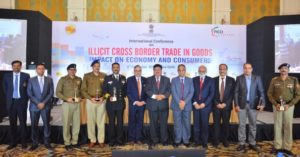International Conference on Illicit Cross Border Trade in Goods: Impact on Economy and Consumers, New Delhi
8/12/2017 | The Leela Palace, New Delhi
Fighting the Invisible Enemy: Smuggled Goods, a Threat to India’s Interests
Across the globe, illicit networks are infiltrating and corrupting legitimate business markets, reducing productivity, and dis-incentivizing investments in research and development—not to mention, jeopardizing public health, emaciating communities’ human capital, and eroding the security of our institutions and governments. FICCI’s Committee Against Smuggling and Counterfeiting Activities Destroying the Economy [CASCADE] has, over the years, been concertedly addressing this issue through its various pan india awarness generation activities, building capacities of law enforcement officials and undertaking ground breaking research about the extent and impact of the menace.
In furtherance of its mandate, CASCADE organized its 3rd edition of its International Conference titled – Cross Border Illicit Trade in Goods: Impact on Economy and Consumers in collaboration with the Department of Consumer Affairs, Govt. of India on December 08, 2016 in New Delhi. The conference was organized with an aim to ensure that national and international stakeholders can dialogue with policy makers to identify opportunities for joint action between governments and the private sector to combat illicit cross border trade.
Inaugurating the conference, Shri Hem Pande, Secretary, Department of Consumer Affairs, Govt. of India said, “Operations in illicit cross border trade is a global problem of enormous scale, impacting virtually every product sector and every country. The illicit market for fake or counterfeit or smuggled products is also one of the biggest challenges faced by Indian industry, which is impacting ‘Brand India’ globally. Given the key role of technology, invention, and innovation in India’s current economic development, the value of “Indian made” products where legitimate business owners’ rights are safeguarded is a key to sustain the country’s growth strategy. Addressing these issues cannot be done in isolation; it is a joint responsibility of consumers, enforcement agencies, the industry and the government.”
Dr. A. Didar Singh, Secretary General, FICCI, in his welcome address, stated that India today had the potential to become a global manufacturing hub. However, widespread smuggling and counterfeiting can act as a dampener in achieving this goal. It is time that India, as a nation and as a part of the global economy, call for stern and resolute counterstrike force against such activities. This has several elements, starting with greater vigil at the borders. Enforcement mechanisms at the borders are critical in combating cross border illegal trading activities. On one hand, while open borders facilitate travel and trade, they also make border control more challenging due to the emerging new forms of cross-border crimes. Hence, it becomes vital that the border-managing enforcement agencies are equipped to identify possible suspects and their victims in such ill-intentioned crimes.
Mr. Najib Shah, Chairman, Central Board of Excise and Customs (CBEC) stated that illegal trade was a growing menace and the need of the hour was collaboration among stakeholders to tackle it. Growth of illicit trade through e-commerce is a new challenge, which also needs urgent attention. Unchecked, it will continue to multiply. We also need to lay equal emphasis on the rights of legitimate businesses, which are greatly impacted by illegal trade.
Mr. Anil Rajput, Chairman FICCI CASCADE, in his address said, “Transnational smuggling through international channels, involving outright smuggling of products or mis-declaring or under invoicing of values is a common and rapidly growing problem in India as in most other parts of the world. Robust regulations, prioritizing enforcement activity and providing sufficient enforcement rights to the agencies is the need of the hour. Increased vigil on our porous borders, especially in the backdrop of our relations with our neighbours should also be treated as a priority.” He further added that illicit trade remains a formidable adversary for the nation. The root cause of this is sometimes a policy framework that incentivises unscrupulous elements to take advantage and make inroads in the system. This encourages anti-social elements to dictate terms to the supply chain and create havoc for the public at large.
During the Conference, a report – ‘Invisible Enemy: A Threat to Our National Interests’ – focusing on the negative impact of smuggled goods on the Indian economy and businesses was released. According to the report, there are five goods where the seizures by the Department of Revenue Intelligence (DRI) has been the highest in the past few years. These five goods are:
1. Gold
2. Cigarettes
3. Machinery Parts
4. Fabric/silk yarn
5. Electronic items
The report findings highlight that smugglers are now switching over to cigarettes and fabric/silk yarn as they are low-risk, high-reward goods. As per the report, in the last one year, the DRI seizures of smuggled cigarettes has increased by 78% (from Rs. 90.75 crores in 2014-15 to Rs. 162 crore in 2015-16) followed by fabric/silk yarn, where the increase is by 73% (from Rs. 24.03 crores in 2014-15 to Rs. 41.78 crore in 2015-16). The seizures of gold have witnessed an increase of 61% (from Rs. 692.35 crore in 2014-15 to Rs. 1119.11 crore in 2015-16), while the DRI seizures of machinery parts and electronic items has seen a decline.
|
Seizure of Smuggled Goods (Rs. Crore) |
|||
|
Product / Commodity |
2014-15 |
2015-16 |
%age Increase/Decrease |
| Cigarettes |
90.75 |
162 |
78.5% |
| Fabric / Silk Yarn |
24.03 |
41.78 |
73.8% |
| Gold |
692.35 |
1119.11 |
61.6% |
| Machinery Parts |
563.18 |
447.1 |
– 20.6% |
| Electronic Items |
37.85 |
17.98 |
– 52.5% |
The primary reason for the rise of smuggled cigarettes into India is the high taxes. Cigarettes smuggling is a low-risk, high-reward criminal activity because high taxes on cigarettes induce great financial incentive for smugglers to earn huge profits. Persistently increasing taxes on cigarettes provide a lucrative opportunity for tax evasion due to tax arbitrage between the country of exports and in the importing country.
On the other hand, the smuggling in fabrics/silk and yarn is primarily driven by the demand-supply gap and the dependence on imports. The Indian textiles industry faces acute shortage of raw materials in the form of cotton and raw silk. While India is the second biggest producer of silk, it is also the second biggest importer of silk in the world (India’s share in 12% of the total world imports) after Italy. India’s dependence on imports of silk and yarn has seen a consistent increase over the last 5 years, having grown from 0.8% to 1.12% of the total imports. This clearly indicates that domestic production is highly insufficient to meet the growing domestic demand, in turn fueling smuggling in the sector.
The conference highlighted and deliberated on issues such as Implications of Illicit Cross Border Trade on the global economy, Strengthening Border Management System for effective enforcement and need for an interdisciplinary approach to sharing market intelligence on illicit cross border trade. The deliberations explored the socio-economic consequences of cross border illicit trade and the policies needed to deter this activity. The discussions contributed to an integrated vision of national security and public safety, providing an interdisciplinary dialogue which will attract industry regulators, customs authorities, law enforcement, major producers of consumer goods, consumer associations and NGOs. With an underlying objective to deepen understanding of illicit trading activities across borders, effective strategies to dismantle such illegal business practices by the public and private sectors were sought.
The conference saw a host of notable speakers, national and international, from World Customs Organization, Delegation of the European Union to India, Department of Homeland Security-Homeland Security Investigations, USA, Unilever, Sanofi, United IPR etc. It was also addressed by notable dignitaries including Mr. P. C. Jha, Advisor, FICCI CASCADE & Former Chairman, CBEC, Mr. Deep Chand, Advisor, FICCI CASCADE and former Special commissioner of Police, New Delhi, Mr. D. P. Dash, Principal Additional Director General, Directorate of Revenue Intelligence, Mr. Rajeev Krishna, Inspector General (OPS), Border Security Force, Mr. Gaurav Tyagi, Commandant & Joint Director Anti-Smuggling & Narcotics Control, Coast Guard, Mr. A K Gautam, Deputy Inspector General, Indo-Tibetan Border Police and Mr. Binod Nayak, Deputy Inspector General, Sashastra Seema Bal.
India has a committed border protection force plus enforcement agencies that is not only safeguarding the long national borders against trans-border criminals including smugglers and terrorists, but also ensures prevention of smuggling and enforcement of anti-smuggling & anti-counterfeiting laws. FICCI CASCADE acknowledges the efforts put in by the officers who show high standards of rigour and intelligence in prevention of smuggling and administration of related matters which impact Indian business and economy. To encourage and acknowledge the work of our law enforcement agencies, FICCI CASCADE also felicitated the best performing officers for the period 2015-16. The winners were as follows:
1. Mr. A K Parayil, Deputy Inspector General-Commanding Officer, Indian Coast Guard Ship Sangram
2. Mr. Sanjeev Kumar Singh, Commandant, Indo-Tibetan Border Police
3. Mr. S. N. Dubey, Deputy Commandant, FGT, Ferozpur, Border Security Force
4. Mr. Dinesh Kumar, Deputy Commandant, BIAAT (Dehradun), Border Security Force
5. Mr. S Sathianarayanan, Deputy Commissioner, Chennai III Customs
6. Ms. Mandeep Sangha, Deputy Director, Directorate of Revenue Intelligence (DRI), New Delhi
7. Mr. Yogendra Kumar, Sub-Inspector, Economic Offences Wing, Delhi Police
Related Posts
Cyclothon—Fight Against Counterfeiting and Smuggling, Lucknow
29/12/2013| Lucknow FICCI CASCADE (Committee Against Smuggling and...
Awareness Programme on Preventive Strategies to Combat Counterfeiting and Smuggling
Date: 6 April 2023 | R D S College, Muzaffarpur, Bihar FICCI CASCADE organised...
Capacity Building Programme for Police Officers on Prevention of Counterfeiting and Smuggling
Focus State: Tamil Nadu FICCI CASCADE (Committee Against Smuggling and...
Seminar on “Combatting Illicit Trade: Insights, Challenges, and Solutions”
30th July 2024 Venue : ITC Windsor, Bengaluru, Karnataka Smuggling and...




